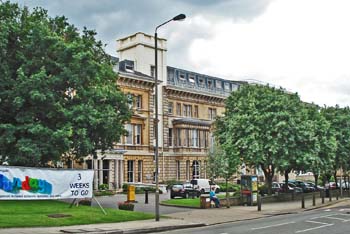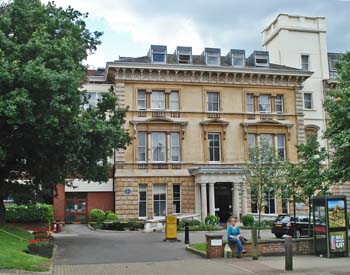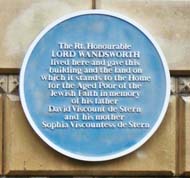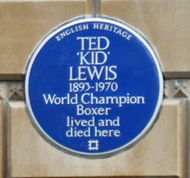Geriatric (Orthodox Jewish)
The Home for Aged Jews was established in 1894 'to provide a Home for, maintain and clothe aged, respectable and indigent persons of the Jewish religion, who shall have attained the age of 60 years, and (if not British subjects) shall have been resident in England for at least seven years'.
The Home was an amalgamation of three charities in the East End caring for the Jewish poor - the Hand-in-Hand Asylum for Decayed Tradesmen at 23 Well Street (founded in 1840), the Widows' Home Asylum (1843) next-door to it at 25 Well Street, and the Jewish Workhouse, also known as the Jewish Home (1871), at 37-39 Stepney Green.
The Home had 105 residents and was managed by five committees, namely the General, the House, the Finance, the Investigating and the Ladies. The senior staff consisted of two Medical Officers, a Master and two Matrons.
In 1904 the banker and philanthropist Lord Wandsworth (1844-1912) purchased a large mansion and its grounds in Clapham for £5,200 and donated it to the charity. In 1907 the Home for Aged Jews moved from its existing premises in Hackney to 'Ferndale' at 105 Nightingale Lane, Wandsworth Common.
By the mid 1920s the Home had 170 elderly residents. In 1924 eye, ear and dental clinics were established on the premises. In 1927 an extension was built for nursing staff accommodation at a cost of £1,452.
The Home did not join the NHS in 1948 but remained a charitable organisation.
In 1949 an Occupational Therapy Department was introduced to provide a range of activities for the residents, such as basket-making and needlework. By the 1950s a regular programme of social events was also provided, in which residents were encouraged to participate.
In 1957 the Asher Wing was built.
In the 1960s the Home was renamed 'Nightingale House (the Home for Aged Jews)'. Its nursing staff consisted of a Matron, a Deputy Matron, 12 State-Registered Nurses and 30 State-Enrolled Nurses and orderlies. The Orthodox religious restrictions were relaxed, such as the compulsory wearing of kippot (skullcaps) and attendance at religious services, and visiting times were extended to Sabbaths and festivals.
In 1967 Rayne House, a block of sheltered apartments, was built across the road from the main campus.
In 1976 a new residential wing - the Gerald Lipton Centre - was built on a piece of adjoining land which had been purchased by a generous benefactor in the 1960s. The ground floor of the building contained various lounges and function rooms, a snooker room, a Succah, a library and other services. The remaining four floors were given over to accommodation for residents, including those needing nursing care.
At the end of the 1970s negotiations began with the Department of Health and Social Security to purchase the neighbouring Jewish Home of Rest in Birchlands Avenue. This was accomplished and both Homes amalgamated in 1979; the Birchlands wing opened in 1980 with 56 beds (today it is a 35-bedded nursing unit).
The Jessie and Alfred Cope Wing and the £45,000 David Clore Art and Craft Centre opened in 1986, and the Balint Wing in 1987.
In 1992 the Jessie and Alfred Cope Wing was refurbished.
By 2001 Nightingale was the largest Jewish residental and
nursing home in Europe, with 300 residents whose average
age was 88 years. By the time they came to live in the home the residents tended to be very frail and dependent, and
required a greater level of nursing care.
Present status (June 2008)
The largest nursing home in the
United Kingdom, its facilities include physiotherapy and occupational
therapy departments, a dental surgery and a pharmacy. There
are also an Art and Craft Centre, a synagogue, a general store and a coffee shop, and a hairdressing salon.
Update: October 2010
In 2009 the management committee applied for planning permission to demolish the synagogue, Birchlands, the nurses' bungalow, the David Clore Art and Craft Centre, the occupational therapy outbuildings and the disused Balint Wing.
Work is expected to begin in 2010 on the erection of a 2-storey extension on the western part of the site, which will provide a specialist dementia care unit with 40 beds, and a replacement synagogue. A 2-storey building on the southern part of the site will contain 20 self-contained extra care suites. The existing concert hall will be refurbished and the gardens landscaped.

Nightingale.

Nightingale House.


The blue plaques on Nightingale House commemorate Lord Wandsworth's gift to the Home (left) and a former resident - Ted 'Kid' Lewis (1893-1970) (right).
www.aim25.ac.uk
www.newwestend.org.uk
www.nightingale.org.uk
www.pharmj.com
www.tes.co.uk
www.thejc.com
Return to home page